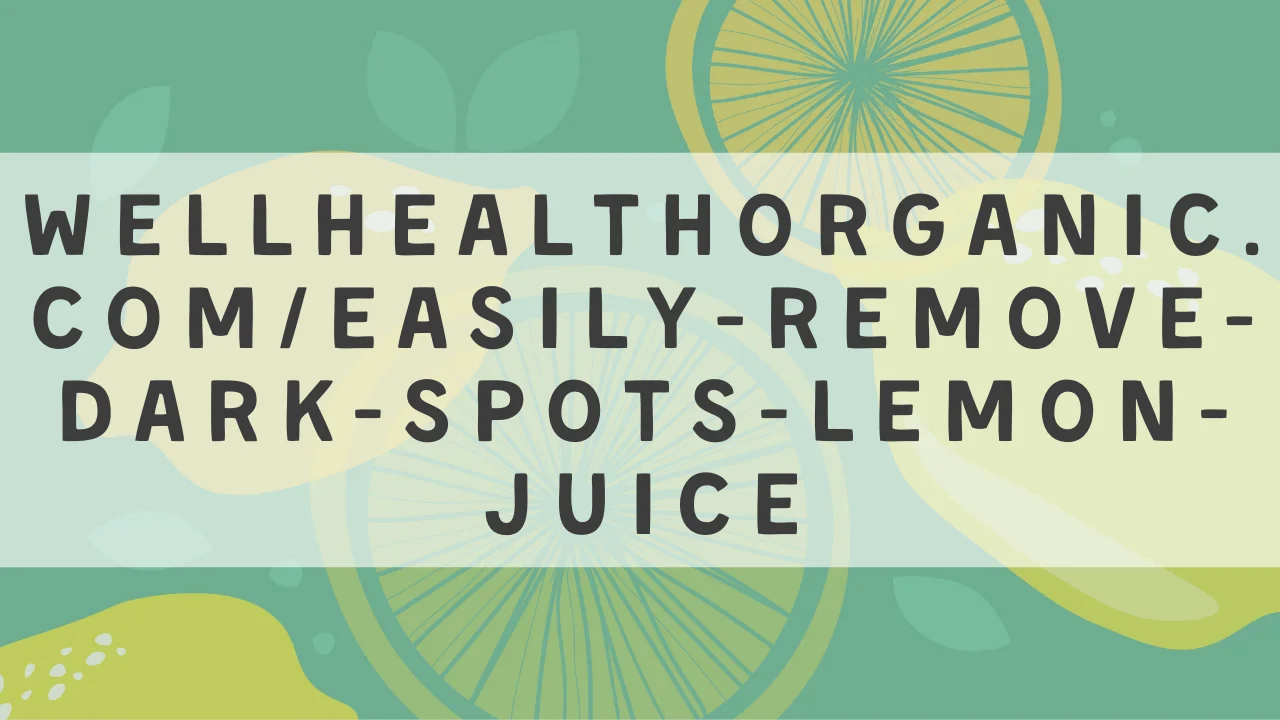Lemon juice, a common household ingredient, has long been heralded for its powerful natural properties that benefit skin health, particularly in the treatment of dark spots. Rich in vitamin C and citric acid, lemon juice acts as a natural bleaching agent, which can help in reducing pigmentation and lightening dark spots on the skin. This introductory exploration delves into how lemon juice can be utilized effectively to achieve clearer, more radiant skin.
Understanding Lemon Juice and Its Skin Benefits
Lemon Juice as a Natural Bleaching Agent
Lemon juice contains high levels of vitamin C, which is known for its potent antioxidant properties. Antioxidants help in fighting against free radicals, reducing skin damage, and promoting a more even skin tone. The citric acid in lemon juice aids in the gentle peeling of the top layers of the skin, thereby reducing the appearance of dark spots.
Vitamin C and Skin Health
Vitamin C is crucial for skin health, as it helps in the production of collagen, which gives skin its elasticity and firmness. By boosting collagen production, vitamin C can help reduce premature aging and ensure that the skin remains youthful and vibrant.
Natural Remedies for Dark Spots
Apart from lemon juice, other natural ingredients like turmeric, honey, and aloe vera are also known to help in reducing dark spots. Combining these with lemon juice can enhance the skin-lightening effects and provide moisture and nourishment to the skin.
Risks of Using Lemon Juice on Skin
While lemon juice is beneficial, it’s important to note that it can cause irritation to sensitive skin due to its acidity. A patch test is recommended before regular use. Additionally, lemon juice can make the skin more sensitive to sunlight, hence a broad-spectrum sunscreen should be used to protect the skin from UV rays.
Effective Use of Lemon Juice for Dark Spots
To use lemon juice effectively, it should be applied directly to the dark spots using a cotton ball, ideally diluted with water to minimize skin irritation. It should be left on the skin for about 10-15 minutes before rinsing off. For best results, consistent application is necessary over several weeks.
How Long Does Lemon Juice Take to Lighten Dark Spots?
One of the most common queries regarding the use of lemon juice is the duration required to see visible results. The effectiveness of lemon juice in lightening dark spots can vary widely among individuals. Factors such as the underlying cause of the dark spots, skin type, and consistency of application play significant roles in the effectiveness of the treatment. Generally, consistent application of lemon juice over a period of several weeks is necessary to observe potential lightening of dark spots.
Can Lemon Juice Permanently Remove Dark Spots?
Understanding Skin Pigmentation
Dark spots, or hyperpigmentation, occur when an excess of melanin, the brown pigment that produces normal skin color, forms deposits in the skin. This can be due to various reasons including sun exposure, inflammation, or other skin injuries.
Temporary vs. Permanent Treatment
Lemon juice may lighten dark spots by bleaching them but does not remove the melanin permanently from the skin cells. For some individuals, the results might revert if the treatment is stopped or if the skin is exposed to significant sunlight without protection.
Importance of Continuous Care
Maintaining the results obtained from lemon juice treatments requires continuous care and protection from sun exposure. Using sunscreen regularly and incorporating antioxidants in the skincare routine can help sustain the lighter skin tone.
Alternatives to Lemon Juice for Dark Spot Treatment
For those whose skin may not respond well to lemon juice or who experience irritation, there are several alternative treatments and ingredients that can be considered:
Commercial Dark Spot Removers
Products containing ingredients like hydroquinone, kojic acid, and retinoids have been proven to be effective in treating hyperpigmentation. These are often recommended for quicker and more reliable results compared to home remedies.
Natural Alternatives
Ingredients like rosehip oil, licorice extract, and green tea are also known for their skin-lightening properties. These can be used as gentler alternatives to lemon juice, especially for those with sensitive skin.
Preparing Lemon Juice Treatments at Home
Simple Lemon Juice Application
To create a basic treatment, squeeze fresh lemon juice and dilute it with an equal amount of water to reduce acidity. Apply this mixture directly to the dark spots with a cotton pad, leave it on for 10-15 minutes, and then rinse with lukewarm water. This method is best for those who are trying lemon juice on their skin for the first time.
Lemon Juice and Honey Mask
Honey is known for its soothing and antibacterial properties, making it a perfect complement to lemon juice for skin care. Mix one part lemon juice with two parts honey to form a paste. Apply this mask to the affected areas and leave it for about 20 minutes before washing off. This mask not only helps lighten dark spots but also moisturizes the skin.
Lemon Juice and Yogurt Cream
Yogurt contains lactic acid which helps in exfoliation and moisturizing the skin. Combine fresh lemon juice with a tablespoon of plain yogurt and apply the mixture to your skin. This can help in reducing pigmentation while providing a soothing effect, making it ideal for more sensitive skin types.
Overnight Lemon Juice Treatment
For a more intensive treatment, mix lemon juice with a small amount of water and apply it to the dark spots before bed. Leave it overnight and wash it off in the morning. This method allows a longer contact time, potentially improving results. However, it’s crucial to perform a patch test first to ensure that the skin does not react negatively.
Safest Ways to Use Lemon Juice on Sensitive Skin
Conduct a Patch Test
Before applying lemon juice to your face, it’s essential to conduct a patch test. Apply a small amount of diluted lemon juice to a discreet area of skin and wait 24 hours to observe any adverse reactions.
Use in Moderation
For sensitive skin, it’s advisable to use lemon juice treatments sparingly—no more than once or twice a week. Overuse can lead to skin irritation and dryness.
Combine with Soothing Ingredients
Mix lemon juice with soothing ingredients like aloe vera or cucumber juice, which can help mitigate the harsh effects of citric acid and provide hydration to the skin.
Aftercare is Essential
Always apply a moisturizer after using lemon juice treatments to help soothe the skin and restore moisture. Additionally, wearing sunscreen during the day is crucial to protect the skin from UV rays and prevent further darkening of spots.
Comparing Lemon Juice and Commercial Dark Spot Removers
Effectiveness
Commercial products are often formulated with higher concentrations of active ingredients and stabilizers, which can provide more predictable and potent results compared to lemon juice.
Cost-Effectiveness
While commercial treatments can be expensive, lemon juice is a cost-effective alternative that can be easily sourced and prepared at home.
Suitability for Skin Types
Commercial products are usually available in different formulations to suit various skin types and sensitivities, whereas lemon juice is a one-size-fits-all solution that might not be suitable for everyone, especially those with very sensitive skin.
Time for Visible Results
Commercial products may yield quicker results due to their potent ingredients and advanced formulations. In contrast, lemon juice may require longer and consistent application to see visible changes.
FAQs
Q: Can lemon juice lighten skin overall?
A: Lemon juice may help lighten dark spots but is not recommended for overall skin lightening due to potential risks like uneven pigmentation and sensitivity.
Q: Is lemon juice safe for all skin types?
A: Lemon juice is highly acidic and can irritate sensitive skin. It’s important to do a patch test before using it extensively.
Q: How often should I apply lemon juice to dark spots?
A: It’s best to start with applications 2-3 times a week to ensure your skin tolerates it without irritation.
Q: Can I leave lemon juice on my face overnight?
A: This is not recommended, especially for those with sensitive skin, due to the high risk of irritation.
Q: Does lemon juice work on dark spots caused by acne?
A: Lemon juice may help lighten post-acne marks, but it should be used with caution to avoid irritating active acne.
Also Read: wellhealthorganic.com:Health-Hazards-Of-Prolonged-Sitting
Conclusion
In conclusion, while lemon juice is a popular and cost-effective natural remedy for lightening dark spots, its use should be approached with caution due to potential skin sensitivity issues and varying effectiveness. For those seeking more reliable or faster results, consulting a dermatologist or considering alternative treatments may be beneficial.

Harold Ayres, a captivating wordsmith and seasoned blogger, weaves tales that transport readers to worlds unknown. With his keen insight and vivid storytelling, Harold’s literary prowess captivates hearts and minds, leaving an indelible mark on the literary landscape.

